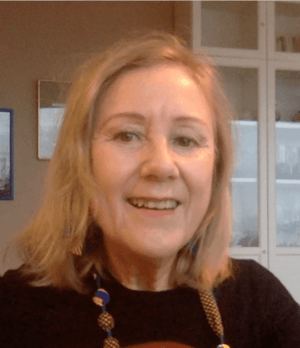Veronica Dahl facts for kids
Quick facts for kids
Verónica Dahl
|
|
|---|---|
 |
|
| Born | |
| Citizenship | Argentine/Canadian |
| Alma mater | Universidad de Buenos Aires University of Aix-Marseille II |
| Known for | Logic programming |
| Awards | Founder of Logic Programming (ALP 1997) |
| Scientific career | |
| Fields | Computer science Bioinformatics Cognitive science |
| Institutions | Simon Fraser University |
| Thesis | Un systeme deductif d’interrogation de banques de donnees en espagnol (1977) |
| Doctoral advisor | Alain Colmerauer |
Verónica Dahl is a brilliant computer scientist from Argentina and Canada. She is known as one of the 15 people who started the field of logic programming. This is a special way of telling computers how to think and solve problems using rules.
Contents
Early Life and Education
Verónica Dahl went to college at Buenos Aires University in Argentina. She earned her degree in computer science in 1974. Because of political problems in Argentina at the time, she moved to France for her advanced studies. In 1977, she became the first person at the Université d'Aix-Marseille to get a doctorate degree in Artificial Intelligence. Artificial Intelligence (AI) is about making computers smart like humans.
Career and Achievements
While studying for her doctorate, Dahl became a leader in logic programming. She created the very first computer system that used logic programming to store and find information. She also made a way for people to ask questions in Spanish, and the computer would understand.
Dahl's work combines many different areas. These include how computers understand language (Computational Linguistics) and how they can help study living things (Computational Molecular Biology). In 1982, she became a professor at Simon Fraser University in Canada. By 1991, she was a full professor.
In 1996, the Logic Programming Association honored her as one of the 15 founders of the field. She also helped develop other important areas like Logic Grammars and Constraint Handling Rules.
Fighting for Fairness
Verónica Dahl is a woman who achieved great things in a field mostly dominated by men. She worked hard to fight for gender equality at Simon Fraser University. She helped other women and took action to make things fairer.
For example, her university once refused to pay for childcare when she traveled for a speech with her baby. She protested, and eventually, a big Canadian science council (NSERC) changed its rules. Now, childcare is a covered expense for nursing researchers they fund! She also pushed for childcare to be offered at logic programming conferences, and now it's a regular thing. She even helped change university rules when a student almost lost their chance to finish their degree because of health problems after having twins.
Global Research and Leadership
Dahl has led many international research projects. She worked with countries like Denmark, Spain, Portugal, Germany, and France. She also collaborated with big companies like IBM. Her work with IBM even led to a record-breaking research contract.
From 2001 to 2005, she was the president of the Association of Logic Programming. In 2008, she received a special award called the Marie Curie Chair of Excellence from the European Commission. This was for her amazing work on using logic to solve problems and process language in biology.
In 2012, she left her full professor job at Simon Fraser University to focus more on her research. The university recognized her with the title of Lifetime Professor Emerita in 2013. She continues her research with funding and through her own AI company, Regenerative AI. She also enjoys music, theater, and dance, and performs as a singer and guitarist.
Important Research Areas
Verónica Dahl's research aims to connect the world of computers with human ways of thinking. She wants computers to communicate more like humans do. Her work always focuses on logic programming and related areas. She has also added new ways for computers to reason, even with incomplete information.
Her research has made a difference in many fields. These include logic, understanding language, artificial intelligence, internet programming, and even studying tiny parts of living things (molecular biology).
Helping Science and Nature
One of her important projects involved finding special DNA markers called "signature oligos". This led to software used every day to study plants and food. This software has helped identify plant diseases that harm forests, like the one causing sudden oak death in California. It's also used to check biodiversity in coral reefs and to find out if fish are being sold illegally.
Her current research looks at how computers can learn grammar for languages that don't have many resources. She also studies how AI can be used to promote fairness and cooperation, instead of control.
Awards and Recognition
Verónica Dahl has received many awards for her work:
- In 1994, she received the Calouste Gulbenkian Award for Science and Technology.
- In 1997, she was named one of the founding members of logic programming by the Association for Logic Programming.
- In 2009, she won the Best Promising Paper Award at a conference about how natural and artificial computing work together.
Books
- (1989) Abramson, H. & Dahl, V. Logic Grammars. Springer.
Literary Works
Verónica Dahl also enjoys writing! She has won awards for her prose and poetry.
Prose
- (1999) Love to Hide, Love to Invent. First Prize in the Prose Category, Cecilia Lamont Literary Contest.
- (2000) Detour. First Prize, Crime55 literary contest.
- (2000) A Case of Possession. First Prize in the Prose Category, Cecilia Lamont Literary Contest.
Poetry
- (2000) Wholeness. Finalist of the 11th Annual Poetry contest, Hope Writers Guild.
- (2000) Life Tides. Finalist of the Millenium 2000 Poetry contest.
See also
 In Spanish: Verónica Dahl para niños
In Spanish: Verónica Dahl para niños

